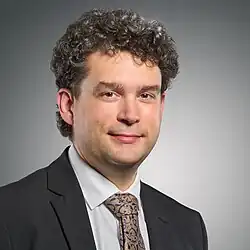Volker Presser

Volker Presser (born 1982)[1] is a German materials scientist and Full Professor (W3) of Energy Materials at Saarland University.[2] He also leads the Research Department "Energy Materials" at the INM – Leibniz Institute for New Materials [3] in Saarbrücken (Germany) and serves as one of two Managing Directors of the Saarland Center for Energy Materials and Sustainability (saarene).[4] His research focuses on electrochemical energy storage, supercapacitors, electrochemical desalination, electrochemical desalination and ion separation, and sustainable nanomaterials; as such, his group develops high-performance lithium-ion batteries and explores emerging systems such as sodium-ion batteries and lithium-sulfur batteries.[5]
Life and career
Volker Presser studied Mineralogy at the University of Tübingen, where he received his doctorate in 2009.[6] After a postdoctoral stay at Drexel University in the United States, where he worked with Yury Gogotsi,[7] he became part of the team that discovered a new family of two-dimensional carbides and nitrides known as MXenes.[8] He returned to Germany in 2012 as a junior group leader at INM [9] and was appointed full professor (W3) at Saarland University in 2015.[10]
Since 2021, he has served as Editor-in-Chief of Energy Advances, an Open access journal published by the Royal Society of Chemistry.[11]
Presser became a Fellow of the Royal Society of Chemistry in 2020.[12]
Scientific work
Presser's research explores novel electrochemical systems for energy and environmental applications, with a focus on supercapacitors,[13] electrochemical water desalination,[14] and ion-selective separation [15]. He is known for his contributions to nanostructured carbon materials (including carbide-derived carbons),[16] carbon-metal hybrids,[17] and two-dimensional materials such as MXenes[18]. His group combines material synthesis, advanced characterization, exploring of energy applications, water technologies, and recycling.[19]
Selected honors and awards
- Bernd Rendel Prize in Geoscience, German Research Foundation (DFG) (2008)[20]
- Hanns Bruno Geinitz Prize, Senckenberg Natural History Collections Dresden (2009)[21]
- Heinz Maier-Leibnitz Prize, German Research Foundation (DFG) (2013)[22]
- Ross Coffin Purdy Award, American Ceramic Society (2013)[23]
- Foundation Award, Stiftung Prof. Joachim Lenz (2015)[24]
- Award for Research Cooperation and High Excellence in Science (ARCHES), Minerva Foundation for Research (2016)[25]
- Zhaowu Tian Prize for Energy Electrochemistry, International Society of Electrochemistry (2022)[26]
References
- ^ "Katalog der Deutschen Nationalbibliothek".
- ^ "Professor Dr. Volker Presser".
- ^ "Energy Materials".
- ^ "About us – saarene". 6 April 2021.
- ^ "Energy Materials – Explore. Create. Apply". www.presser-group.com. Retrieved 2025-08-14.
- ^ Presser, Volker (2009). "Oxidation and wet wear of silicon carbide".
- ^ "Prof. Dr. Volker Presser".
- ^ Naguib, Michael; Kurtoglu, Murat; Presser, Volker; Lu, Jun; Niu, Junjie; Heon, Min; Hultman, Lars; Gogotsi, Yury; Barsoum, Michel W. (2011). "Two-Dimensional Nanocrystals Produced by Exfoliation of Ti3AlC2". Advanced Materials. 23 (37): 4248–4253. Bibcode:2011AdM....23.4248N. doi:10.1002/adma.201102306. PMID 21861270.
- ^ https://www.dfg.de/resource/blob/285888/forschung-2015-01.pdf
- ^ "Pionierarbeit für die Energiewende". 6 May 2019.
- ^ "Energy Advances".
- ^ "Volker Presser". Royal Society of Chemistry. Retrieved 30 July 2025.
- ^ Béguin, François; Presser, Volker; Balducci, Andrea; Frackowiak, Elzbieta (2014). "Carbons and Electrolytes for Advanced Supercapacitors". Advanced Materials. 26 (14): 2219–2251. Bibcode:2014AdM....26.2219B. doi:10.1002/adma.201304137. PMID 24497347.
- ^ Porada, S.; Zhao, R.; Van Der Wal, A.; Presser, V.; Biesheuvel, P.M. (2013). "Review on the science and technology of water desalination by capacitive deionization". Progress in Materials Science. 58 (8): 1388–1442. doi:10.1016/j.pmatsci.2013.03.005.
- ^ Srimuk, Pattarachai; Su, Xiao; Yoon, Jeyong; Aurbach, Doron; Presser, Volker (2020). "Charge-transfer materials for electrochemical water desalination, ion separation and the recovery of elements". Nature Reviews Materials. 5 (7): 517–538. Bibcode:2020NatRM...5..517S. doi:10.1038/s41578-020-0193-1.
- ^ Presser, Volker; Heon, Min; Gogotsi, Yury (2011). "Carbide-Derived Carbons – from Porous Networks to Nanotubes and Graphene". Advanced Functional Materials. 21 (5): 810–833. doi:10.1002/adfm.201002094.
- ^ Fleischmann, Simon; Tolosa, Aura; Presser, Volker (2018). "Design of Carbon/Metal Oxide Hybrids for Electrochemical Energy Storage". Chemistry – A European Journal. 24 (47): 12143–12153. Bibcode:2018ChEuJ..2412143F. doi:10.1002/chem.201800772. PMID 29672971.
- ^ Naguib, Michael; Mashtalir, Olha; Carle, Joshua; Presser, Volker; Lu, Jun; Hultman, Lars; Gogotsi, Yury; Barsoum, Michel W. (2012). "Two-Dimensional Transition Metal Carbides". ACS Nano. 6 (2): 1322–1331. Bibcode:2012ACSNa...6.1322N. doi:10.1021/nn204153h. PMID 22279971.
- ^ "Archived copy" (PDF). Archived from the original (PDF) on 2025-04-19.
{{cite web}}: CS1 maint: archived copy as title (link) - ^ "DFG - Deutsche Forschungsgemeinschaft - Übersicht aller Bernd Rendel-Preisträger*innen". www.dfg.de. Retrieved 2025-08-14.
- ^ "Hanns-Bruno-Geinitz-Preis | Senckenberg Gesellschaft für Naturforschung". Archived from the original on 2020-04-02. Retrieved 2025-08-14.
- ^ "Übersicht aller Heinz Maier-Leibnitz-Preisträger*innen".
- ^ "Archived copy" (PDF). Archived from the original (PDF) on 2019-07-18.
{{cite web}}: CS1 maint: archived copy as title (link) - ^ "Archived copy". Archived from the original on 2021-04-11.
{{cite web}}: CS1 maint: archived copy as title (link) - ^ "Fromer Arches Awardees".
- ^ "Awards Archive".